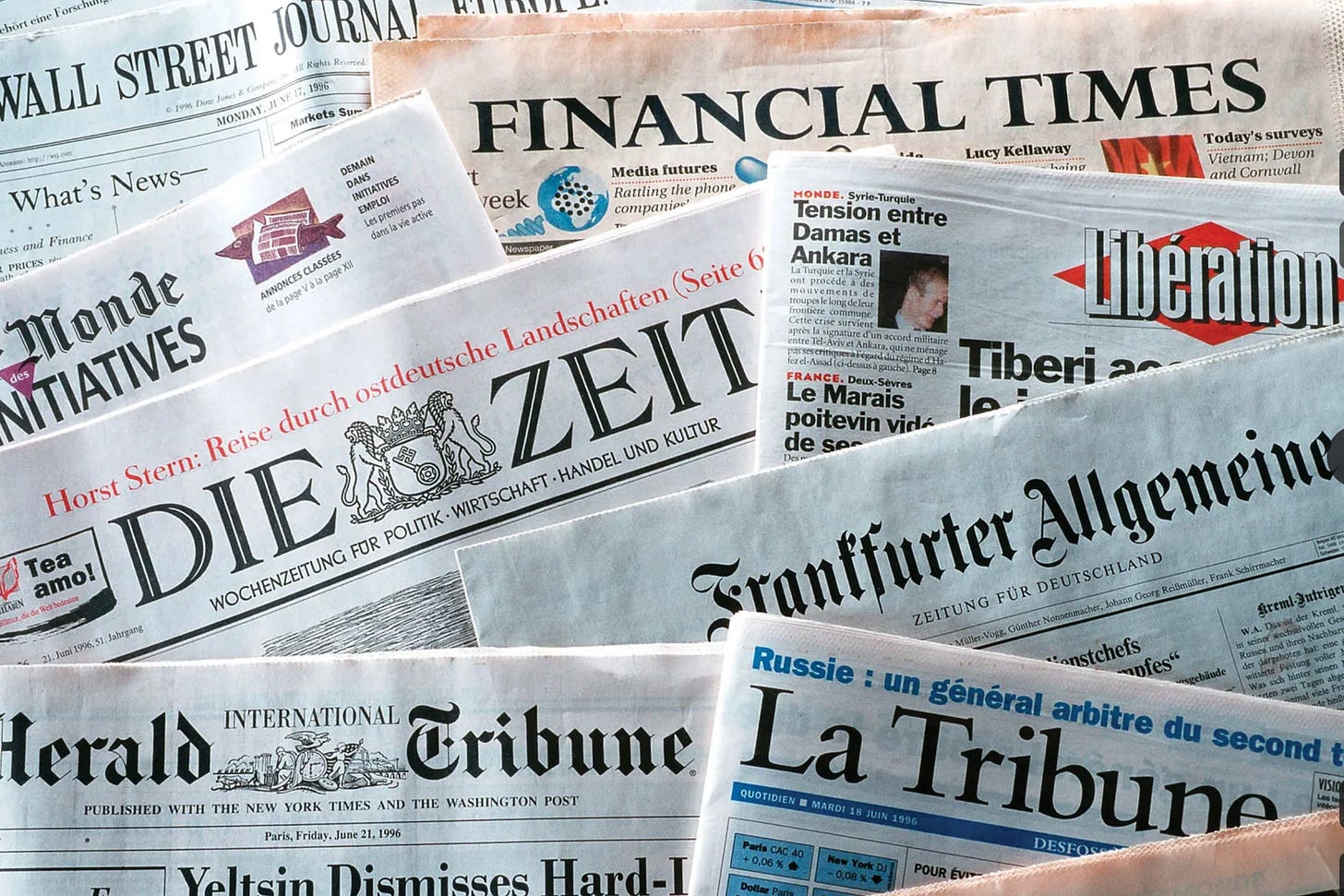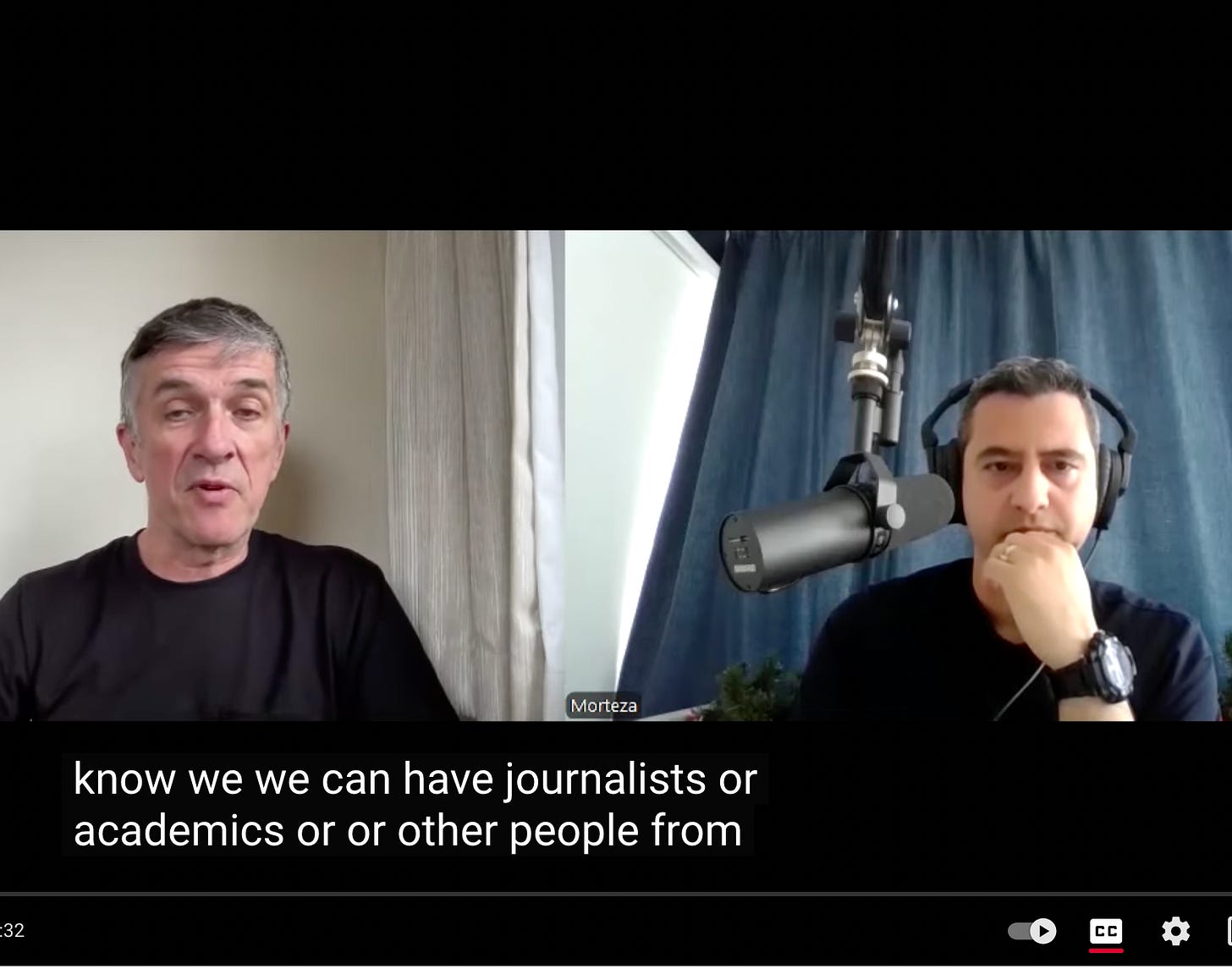The media and political opinion
Is freedom of the press under threat? Are social media doing better?
Morteza Sharifi and I have recorded another conversation, this time on: The Role of Media in Shaping Public Opinion: How traditional and social media influence democratic decision-making. You can watch and listen on Youtube. Or you can listen on Morteza’s Focus on Iran Spotify podcast.
A free press and diverse media organisations are essential for any supposedly free and democratic society. A mix of state-funded, non-commercial and commercial outlets record and keep people informed about unfolding events, creating “the first rough draft of history”. As I write this, for example, Syrian rebels have successfully overthrown the authoritarian ruler Bashar al-Assad. This is momentous news, and I rely on a number of mainstream media channels to stay up-to-date – even if they aren’t as quick off the mark as some social-media observers who are closer to the action. But people can say what they like on social media, and we rely on professional journalists to verify sources and facts before they publish.
We also rely on journalists to dig below the surface: to investigate and bring to light incompetence, hypocrisy or wrongdoing. They should hold governments and businesses to account, without fear, in the interests of the whole of society.
Furthermore, they analyse events and provide commentary and opinion that helps us to understand the context, history or political implications of events from differing viewpoints.
One of the reasons why people express a distrust of media in recent times is that journalists’ political opinions often get in the way of the factual reporting of events, making what we read look prejudiced in favour of particular political viewpoints and against others. And interviewers give some politicians an easier time than others.
The selection of the news agenda, and the terms used to headline and describe events introduce biases that an uncritical audience could accept unquestioningly – or that a critical and sceptical audience may find disappointing or irritating. Accusations of left-wing bias come from the right, and vice versa. It works both ways, and one can point to media channels that are biased either way. I won’t get into a contest about which side is the more biased or the more objective, as that too would be a matter of subjective political judgements.
It’s impossible to be completely unbiased. One can even say that journalism that seeks to uphold democracy is already expressing bias in favour of one particular kind of political system. And, for example, while the banner of The Washington Post declares “Democracy Dies in Darkness”, they lost thousands of subscribers after their bosses said they would no longer endorse one candidate for president. On that occasion, an effort not to be biased, or not to try to influence an election, came with a price. Had those cancellations gone too far, the Post might have died defending democracy – if we agree that democracy requires mainstream media to let people decide for themselves who to vote for. (Specialised media channels might allow themselves to be openly biased.)
Source: https://www.britannica.com/topic/newspaper#/media/1/413113/108310
We all have political opinions and biases, and these will come out (deliberately or not) through the choices that journalists and newsrooms make. Professionals can at least strive to be balanced: to give voice to differing points of view and to take care about using neutral language when describing political actors and events. It’s harder to do than you might think, if you haven’t tried to do it before.
The media environment has changed dramatically with the advent of social media, as anyone can now publish an opinion, no matter how well- or ill-informed it may be. This enables the spread of misinformation and disinformation, but this problem is not new (just read Thomas Hobbes), and indeed it’s often exaggerated. One of the best academic papers I’ve read recently on new media is: Altay, Berriche, and Acerbi, 2023. Misinformation on misinformation: Conceptual and methodological challenges. Social media+ society, 9(1). It’s an open access article.
Morteza and I got on to talking about free speech, of course, and I hope you’ll enjoy listening.
Let me clarify a couple of points. In my opinion, just feeling offended by something that someone said doesn’t make them wrong, nor does it give anyone a right to shut them down. People are free to say they feel offended, of course, but a more effective strategy is to tackle the matter on the grounds of evidence, logic and principles.
On my substack, however, I will delete comments that insult or abuse people (although I’ve only done that once). That isn’t a threat to your freedom of speech, because there are other venues where you can say that kind of thing. Just don’t do it here, as I want to encourage a higher standard of political discourse than seen on X. The best uses of our freedom of speech recognise the freedom and dignity of others, rather than just express our own unfiltered feelings about others or indulge in ad hominem attacks.
I’m not being fully free if I insist that you can’t stop me from using abusive language, and then do so just to prove the point. That’s like saying that I shouldn’t have to grow up. To be truly free, we need to use our intelligence and to recognise the freedom of others. I can’t be fully free on my own, after all.





Again, factual reporting of matters such as climate change and the value of vaccination in protecting against Covid, by major media has been labelled biased by right-wing politicians and right-wing commentators on social media, contributing significantly to growing distrust in traditional media.
I wrote something on media bias sites for everyone here. https://www.publicenlightenment.com/p/can-media-bias-sites-be-trusted?r=2xd80&utm_campaign=post&utm_medium=web&showWelcomeOnShare=false